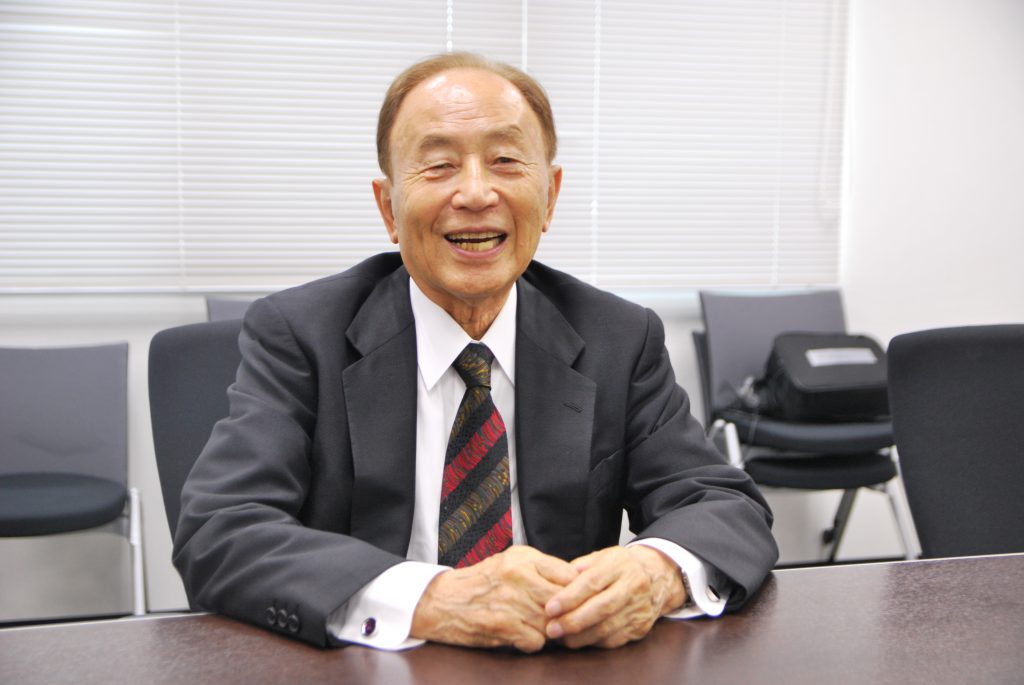Email Magazine
Interview with Corporate Auditor Shinohara (6/23/2021)
Yoshinori Shinohara, 86, auditor of Nanophoton, has been a member of Nanophoton since its establishment in February 2003. After completing a master’s degree in economics at the Osaka University Graduate School of Economics, he registered as a certified public accountant in 1963 and served as vice chairman and representative counselor of Asahi Audit Corporation (now KPMG AZSA & Co.). In November 2002, after retiring, he established the NPO Osaka University Entrepreneurship Support Organization and became its president, and has been involved in supporting the start-up of various ventures such as Nanophoton. We asked him about his thoughts on university-launched ventures. (Email Newsletter editor-in-chief / freelance writer Takeshi Nemoto)

—Why did you decide to become a CPA?
When I was a student at the Faculty of Economics at Osaka University, I had a professor named Professor Torao Nakanishi. He was the founder of the cost accounting system and the CPA system in Japan. I respected his personality and was allowed to join his seminar. Mr. Nakanishi told me that the CPA system in Japan would be very important in the future, so I decided to become a CPA. I like new things, you know.
It was 1959 when I passed the test. I’ve been doing this for over 60 years. I’m kind of a pioneer of CPA.
At first, I was an apprentice to a great teacher with registration number 12, and I was in charge of audit certification for several companies. I was involved at a very good time when Japan’s industry was emerging. At that time, the overall economy was on the upswing, so I was not worried at all even though there were fluctuations in income and expenditure from period to period.
Asahi Audit Corporation (now KPMG AZSA & Co.) is a major firm whose name I know even as an outsider. When the merger took place, you were appointed as the managing director.
At first, I belonged to an auditing firm, Daiwa Accounting Office. It was an auditing firm created by a group of scholars in Osaka. Then it went through a series of mergers and I ended up in the middle.
—Why did you become involved in university-launched ventures after you retired?
I’ve been watching Japanese industry for a long time, and I’ve seen that companies that properly utilize technology for the benefit of society have grown greatly and supported Japanese industry. That’s why, when thinking about Japanese industry, I thought that we need to nurture venture businesses. At that time, there was a feeling that it was wrong for professors at universities, especially national universities, to make money. Furthermore, there was a deep valley between university technology and commercialization, which was difficult to cross. In order to bridge this gap and make use of Osaka University’s technology in society, I created an NPO called the Osaka University Entrepreneurship Support Organization.
—What kind of support is it exactly?
From building a company to raising funds and intellectual property issues. In particular, how to help commercialize the technology.
—Shortly after starting the NPO, I was involved in the founding of Nanophoton. How did you get involved?
I got to know Mr. Kawata (Chairman of Nanophoton, Professor Emeritus of Osaka University) and he said he wanted to start a business, so I said, “I’ll support you. Dr. Kawata is a prominent figure in international academic societies and has wonderful technology. In addition, he has grown a lot as a manager over the past ten years. I have learned a lot about practical business. It is rare to find a person like Mr. Kawata who can also do practical work.
—I think it is quite difficult to understand nanophoton technology.
It is difficult, but interesting. Nowadays, when we talk about microscopes, we are talking about Raman microscopes.
—You studied economics and became a CPA, but do you also like technology?
I like it. In high school, I was very good at math and physics. I like to think logically. Originally, I was thinking of going into engineering, but when I talked to a relative who went to the Faculty of Law at Kyoto University, he said, “Of course humanities is better,” so I changed my mind just before the entrance exam. Economics is also mathematics, you know. So I have no resistance when it comes to technology.
—Is the importance of university-launched ventures increasing?
That’s right. Companies are required to make a profit in a short period of time, so they are not able to conduct long-term basic research that would take 10 years. On the other hand, universities have an enormous amount of technology. This is why joint research and consortiums with universities are becoming extremely important. The word “co-creation” is very popular now. I think we need to make more use of the technologies available at universities.
—The Osaka University Entrepreneurship Support Organization is not only involved in starting a joint stock company, but also in social projects.
Yes. As part of our support for social entrepreneurship, we have been involved in the establishment of the Pleasure Theater Company General Incorporated Association, Sakai City Opera General Incorporated Association, and the Institute of Child Development Science, a public interest incorporated association.
—Have you always had an interest in social contribution?
Making money is important, but if you only chase after money, you will not be able to do your job. You have to be able to make society a better place. I will continue to work for the betterment of society to the extent that I can.